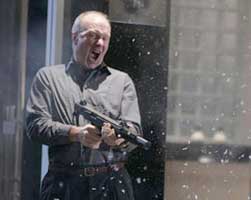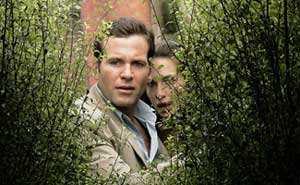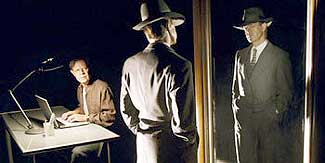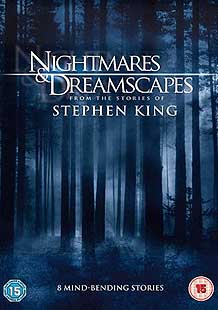The Turner Network series Nightmares & Dreamscapes (2006) was issued as a three-disc dvd set, packaged as Dreamscapes, & as Nightmares & Dreamscapes from the Stories of Stephen King but heavily promoted in text ads as Stephen King's Nightmares & Dreamscapes. Five of the eight tales are from his short story collection Nightmares & Dreamscapes (1993), the other three from two other collections.
 The eight episodes were divided three, three & two between the discs, each under an hour length, with plenty of minor extras. As short films they're uneven, from positively dreadful to almost okay. None are outstanding. The eight episodes were divided three, three & two between the discs, each under an hour length, with plenty of minor extras. As short films they're uneven, from positively dreadful to almost okay. None are outstanding.
The theme music is kind of aggressively PBS Mystery Theater with Diana Rigg so apparently the intent was something classier than, say, Tales of the Crypt. And I guess it is classier than intentional kitsch, but unintentional kitsch is probably not an improvement.
The first episode that aired, & first on Disc 1 of the dvd set, is Battleground, surprisingly a very good satire on human violence. There's not a moment of padding in the telling, & had it been representative of the whole series, what a fine series it would've been.
William Hurt plays an assassin hired to kill the CEO of a big toy company. The pacing is brilliantly done as he takes out the guards & breaks the security codes & takes down the target. On his way out, he steals a limited edition ballerina statuette from the murdered CEO's personal collection. The ballerina will go into a display case at his ritzy home, a case of momentos of professional hits.
One item in the assassin's cabinet is creepy. It's an African doll that many will recognize as the Zuni warrior fetish-doll from the Richard Matheson teleplay Trilogy of Terror (1975). It's more than an idle reference, as the present tale has a parallel theme, & the script for Battleground was written by Richard Matheson's son, Richard Christian Matheson, a chap as handsome & as talented as his dad.
So far there's been no dialog & slowly it becomes evident there never will be any. It's a tale well-told strictly with mime & action.
Our killer receives a package in plain brown wrapper from the dead man's mother. He opens it carefully as though it might be a bomb, but it's a vintage soldier set.
Very soon we know why Brian Henson of the Henson Creature Workshop was chosen to direct this one. The little toy soldiers are alive, & will avenge a mother's son.
At any time the assassin could've left the battlefield of his home, but he's not the sort of guy to give up ground to three-inch-tall enemies. And if this killer's pokerfaced battle with menacing Lilliputians is in general more amusing than spooky, it nevertheless makes for a darned cute war adventure, giant vs the brave little grunts, with the final grunt such a tiny psycho warrior you just gotta love him.
The couple (Claire Forlani & Eion Bailey) in Crouch End make for a dull beginning, with focus on their "loving" relationship which is deadly dull, due to both of them being such zipper brains.
 Such empty dinkuses can only be interesting after, but not before, encountering the unknown. It's a talky-talky script into the bargain, headed for a conclusion that would've required at least five seconds of top-notch special FX to not be ridiculous, but no one could spare the extra twenty-nine cents. Such empty dinkuses can only be interesting after, but not before, encountering the unknown. It's a talky-talky script into the bargain, headed for a conclusion that would've required at least five seconds of top-notch special FX to not be ridiculous, but no one could spare the extra twenty-nine cents.
Eventually a cabby warns them they're headed to a part of London, Crouch End, where there's "a thin spot" between dimensions. He personally won't go far into that neighborhood & they're forced to walk the rest of the way, warned though they have been that this neighborhood was founded atop an ancient druid slaughter ground.
Another tedious patch of time pokes by with the pressing query "What was on the other side of the hedge?" And even as the film gets legitimately strange, it is at its heart much more of a "domestic hate" story because facing the unknown just gets this couple from crabbing at each other. Perhaps it is the curse of Crouch End that their "loving" nature becomes false, but crabby couples really aren't that much fun to watch.
There are truly ridiculous sequences, like when Lonny faces the wind funnel. The story is so void of visual imagination that it is soon obvious nothing interesting is going to be revealed unless in some "surprise" ending, so that ultimately everything until the end is padding. The real meat of the film doesn't begin until its eight minutes from the end.
Except for about fifteen seconds of the cat demon, the bulk of this episode is amazingly awful. For coda there's a bunch of last-minute dumbass references to H. P. Lovecraft's Cthulhu mythos not brought up prevously, & for a topper, a supremely dumbass CGI monster.
William H. Macy is a fine actor & he makes as much of a poor script as anyone could. He is Clyde Umney, title character of Umney's Last Case, a parody of a private eye.
 It's not as funny as Guy Noir on the radio show Prairie Home Companion, but it tries, & it's a good deal weirder & more intriguing than most of the films in this three-volume set. It's not as funny as Guy Noir on the radio show Prairie Home Companion, but it tries, & it's a good deal weirder & more intriguing than most of the films in this three-volume set.
Umney wakes up after a night of glangster killing & discovers everything in his world has in one way or another become the opposite of what it had been.
It begins to seem as though Umney lives in a Walter Mitty daydream, or rather escaped from one, & the dream is suddenly rebelling against him. Sam Landrey shows up & he, too, is William H. Macey. Landrey is a writer, & Umney is one of his characters.
For Umney it is perpetually the 1930s, a film noir world of the imagination. Conversation between nerd writer & his tough gumshoe character is a pretty silly cliche, but the difference in this take on a hoary idea writer meeting creation is that Landrey's life is full of grief & he wants to trade places with his character. He wants Umley to be the writer, so that the creator can disappear into his own creation.
Closer to an old Twilight Zone episode in sentimentality, it would've made a very good half-hour episode of Rod Serling's series. Alas, it's too long by half.
Jacqueline McKenzie likewise plays two roles, the sexy film noir dame Gloria in the detective fiction come to life in an alternate world, & Landrey's clinically depressed wife in the real world. Had the script been able to show her need, too, to switch universes, the length of the play might've been justified just to achieve that.
The transfer of Umney & Landrey each into the others' world is cute, though perhaps cutsie would more accurately describe it. After that, it gets all serious for the last act & kind of just feels like someone didn't know they should've ended the story sooner.
copyright © by Paghat the Ratgirl
|

 The eight episodes were divided three, three & two between the discs, each under an hour length, with plenty of minor extras. As short films they're uneven, from positively dreadful to almost okay. None are outstanding.
The eight episodes were divided three, three & two between the discs, each under an hour length, with plenty of minor extras. As short films they're uneven, from positively dreadful to almost okay. None are outstanding. Such empty dinkuses can only be interesting after, but not before, encountering the unknown. It's a talky-talky script into the bargain, headed for a conclusion that would've required at least five seconds of top-notch special FX to not be ridiculous, but no one could spare the extra twenty-nine cents.
Such empty dinkuses can only be interesting after, but not before, encountering the unknown. It's a talky-talky script into the bargain, headed for a conclusion that would've required at least five seconds of top-notch special FX to not be ridiculous, but no one could spare the extra twenty-nine cents. It's not as funny as Guy Noir on the radio show Prairie Home Companion, but it tries, & it's a good deal weirder & more intriguing than most of the films in this three-volume set.
It's not as funny as Guy Noir on the radio show Prairie Home Companion, but it tries, & it's a good deal weirder & more intriguing than most of the films in this three-volume set.